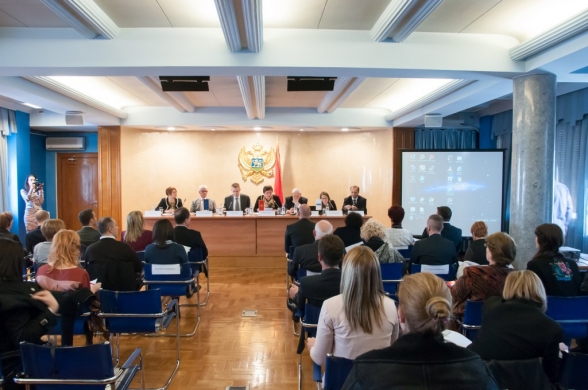Opinion made by ODIHR experts/activists fromWarsaw on the impact of ratified Council of Europe Convention on Preventing and Combating Violence against Women and Domestic Violence on the legislation in Montenegro was presented at today held 36th meeting of the Gender EqualityCommittee, which was attended by the Deputy Prime Minister and Minister of Foreign Affairs and European Integration and the President of the Council for Protection against Discrimination Igor Lukšić PhD, Head of the EU Delegation to Montenegro Mitja Drobnič, Deputy Head of the OSCE Mission to Montenegro Waldamar Figaj and Minister for Human and Minority Rights Suad Numanović PhD. Opinion on the Draft Law on the Compensation of Victims of Crimes in Montenegro was presented as well, which was spoken by the Head of OSCE/ODIHR Department for Legislation Alice Thomas and OSCE/ODIHR Gender Equality Advisor Lana Ackar.
Deputy Prime Minister and Minister of Foreign Affairs and European Integration and the President of the Council for Protection against Discrimination Igor Lukšić expressed satisfaction in relation to the assessment presented in the ODIHR Opinion related to positive changes made in Montenegro, both at the legislative plant and plan of public policies in the field of prevention and protection from violence against women and domestic violence. These assessments are encouraging and represent a stimulus for institutions in Montenegro to continue activities aimed at further harmonization of provisions of national legislation with the provisions of the Istanbul Convention.
Head of the EU Delegation to Montenegro Mitja Drobnič, in his opening speech emphasized that good laws are important in this field, but not sufficient. Their determined implementation is necessary, as well as the work on reducing inequalities between women and men and raising public awareness about the problem of domestic violence and violence against women. In this regard, it is of particular interest to permanently strengthen state institutions, effective training of judges, prosecutors, police officers, social workers in order for the entire institutional mechanism to strongly oppose to violence against women and domestic violence and provide support to victims. The European Union encourages Montenegro to continue improving its legal framework for gender equality, and to strengthen efforts to combat domestic violence in reducing the gender gap in all areas of life.
Deputy Head of the OSCE Mission to Montenegro Walemar Figaj pointed out that the opinion of the Mission is that Montenegro made significant progress by adopting a series of laws and follow up documents, however, until the implementation of these laws is adequately seen in practice, it will not be possible to talk about real progress. It is necessary to permanently raise awareness, both of the institutions and the citizens, that the fight against violence against women and domestic violence and providing the necessary support to victims must be an integral part of everyday life in the community.
Minister for Human and Minority Rights Suad Numanović PhD reminded that Montenegro demonstrated commitment to this issue and was among the top five states parties to the Convention, which entered into force on 1 August of the current year and that we were obliged to observe what changes were necessary in the legislative and strategic framework in order to fully implement standards contained in this Convention, which were related to prevention and combating violence against women and domestic violence. If we want to establish long-term policy for the provision of general services to victims of gender-based violence, proactive approach is necessary which would involve all relevant actors.
The meeting was attended by MPs Kemal Zoronjić and Milorad Vuletić, representatives of certain institutions, NGOs and representatives of the OSCE and UNDP.









